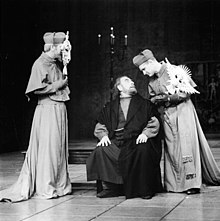Life of Galileo
Life of Galileo (German: Leben des Galilei), also known as Galileo, is a play by the twentieth-century German dramatist Bertolt Brecht with incidental music by Hanns Eisler. The play was written in 1938 and received its first theatrical production (in German) at the Zurich Schauspielhaus, opening on 9 September 1943. This production was directed by Leonard Steckel, with set-design by Teo Otto. The cast included Steckel himself (as Galileo), Karl Paryla and Wolfgang Langhoff.
The second (or 'American') version was written in English between 1945–1947 in collaboration with Charles Laughton, and opened at the Coronet Theatre in Los Angeles on 30 July 1947. It was directed by Joseph Losey and Brecht, with musical direction by Serge Hovey and set-design by Robert Davison. Laughton played Galileo, with Hugo Haas as Barberini and Frances Heflin as Virginia. This production opened at the Maxine Elliott's Theatre in New York on 7 December of the same year.
In 1955, in the wake of the Manhattan Project, Brecht prepared a third version. A production, by the Berliner Ensemble with Ernst Busch in the title role, opened in January 1957 at the Theater am Schiffbauerdamm and was directed by Erich Engel, with set-design by Caspar Neher. The play was first published in 1940.
...
Wikipedia

